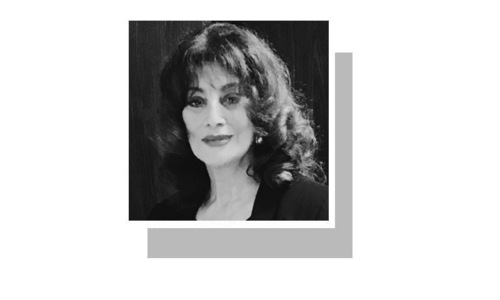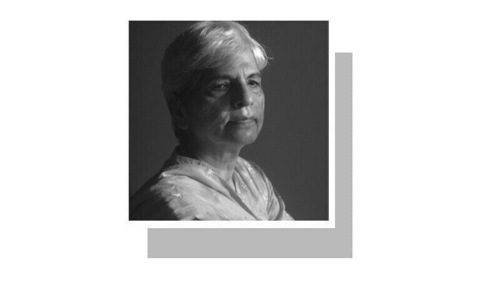“RISALO, the collection of the most important verses and songs of Shah Abdul Latif, is not just the most important document of mystical poetry of Sindh but of the entire sub-continent.” So avers a leading literary critic. And it was to pay tribute to this great sufi that the Lahore chapter of the Pakistan Academy of Letters arranged a meeting in its offices last week. It was presided over by the research scholar, Anwar Chaudhry, while those who spoke on the occasion were Nasreen Anjum Bhatti and Ghulam Qasim Kausar, both from Radio Pakistan.
Shah Abdul Latif was born in AD 1689-90 in a small town of Hyderabad district and died in 1752-53. He rests in a stately mausoleum built in the days of the ruler, Ghulam Shah Kalhoro, who was a great admirer of the poet.
There is some doubt whether Shah Abdul Latif received any formal education. But research scholars, including the German, Dr Trump, are convinced that he must have received a very thorough education as he spoke and wrote in Arabic, Persian, Hindi and other languages. He knew the Quran in all details and was at home with the philosophy of his time and in sufism as well as the Vedanta.
There is a consensus that Latif is not only a poet of distinction but also a great scholar. According to tradition, he always had three books with him — the Quran, the Mansnavi of Jalaluddin Rumi and the Risalo, the collected verses of his great-grandfather, Shah Abdul Karim. He spent the last ten years of his life in his self-constructed hamlet, Bhit, from where he spread his deepest thoughts to the world and where his most beautiful verses were created.
Nasreen Anjum Bhatti spoke mostly about the musical content in the poetry of Shah Abdul Latif and said that he had confined himself to 30 ragas. But it is generally acknowledged that the music and the word in Shah Latif’s poetry are so entwined with each other that it has no parallel in any of the lyrical poetry, both classical and modern, during the last two thousand years. This is the opinion of Dr HT Sorley, author of Shah of the Bhit. He belonged to the Indian Civil Service and is a known Latif scholar.
Somewhere around 1720, Shah Latif wrote many poems and set them to music himself. These were sung by the musicians among his young followers.
Ghulam Qasim Kausar said that the Shah’s poetry has all the elements that go to make a major poet. He has the understanding of the complexities of human problems and his views reflect wide sympathy for the downtrodden. Kausar added that Shah Latif could well be considered the first natural poet of Sindh. In fact, in it lives the soul of his land. It is for this reason that his songs have assumed folk status. Even the Nobel laureate, Rabindranath Tagore, wrote in a letter: “Every thousand years is born a man in whom the soul of an entire people comes to expression. Such a man was Valmiki in (ancient) India, Homer in Greece, Virgil in Rome, Dante in Italy, Goethe in Germany and Tolstoy in Russia. And such a man was also Shah Abdul Latif in Sindh.”
MUSTANSAR Husain Tarar may be better known as a travelogue writer but he has also written some prize winning novels, and short stories, TV plays and newspaper columns. If I am not mistaken, he has over 30 published works so far. But the latest book that he has produced, and which he claims is a novel, is much shorter than the previous ones. In fact, I consider it more of a documentary than a novel. Titled Qila Jangi, it is an indictment of those who claim to be the champions of human rights, justice and fair play. In the so-called war against terrorism, what the Americans and their allies have done to the innocent people of Afghanistan has been brought out in this book in rather gruesome detail. With cries of pain on every page and using the live character of the American Abdul Hamid John Walker, the book begins with the story of those who had laid down their arms following the cruel bombings in Afghanistan and were brought to the fort (Qila Jangi) near Mazar Sharif on the promise of freedom but were massacred in cold blood.
The story goes on to describe the struggle for survival of those who managed to escape the indiscriminate firing within the four walls of the fort and how they managed to remain alive for some time in an underground cell. With wounds all over their body, and without access to water or food, they hear the neighing of a horse probably standing among the corpses strewn in the courtyard above. They somehow manage to bring it down to their cell so that it could be slaughtered and eaten. But then the question arises as to who would slaughter it. John Walker refuses flatly. “I love ponies,” he says, “it reminds me of my own back home.” He prefers to die of hunger.
All the 216 pages of the book have to be read to be appreciated. Mustansar deserves credit for being able to portray so graphically the mental attitude and psychology of a people devoted to a sacred cause and their behaviour while awaiting sure death.
A friend who borrowed the book to read it, suggested while returning it that it should be translated into English so that the so-called civilized Western world knows what atrocities were committed in Afghanistan.
P.S: I have just received a call from Dr Agha Suhail, informing me that the most regular visitor of the Pak Tea House, the veteran poet Asrar Zaidi, has passed away. And it is no news either, as I am told he passed away three days ago. Surprisingly, there was not a line about him in the newspapers. — Ashfaque Naqvi










































